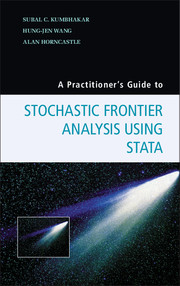Book contents
- Frontmatter
- Dedication
- Contents
- Preface
- PART I GENERAL INFORMATION
- PART II SINGLE EQUATION APPROACH: PRODUCTION, COST, AND PROFIT
- PART III SYSTEM MODELS WITH CROSS-SECTIONAL DATA
- 6 Estimation of Technical Efficiency in Cost Frontier Models Using System Models with Cross-Sectional Data
- 7 Estimation of Technical Efficiency in Profit Frontier Models Using System Models with Cross-Sectional Data
- PART IV THE PRIMAL APPROACH
- PART V SINGLE EQUATION APPROACH WITH PANEL DATA
- PART VI LOOKING AHEAD
- APPENDIX
- A Deriving the Likelihood Functions of Single Equation Frontier Models
- B Deriving the Efficiency Estimates
- C Deriving Confidence Intervals
- D Bootstrapping Standard Errors of Marginal Effects on Inefficiency
- E Software and Estimation Commands
- Bibliography
- Index
7 - Estimation of Technical Efficiency in Profit Frontier Models Using System Models with Cross-Sectional Data
Published online by Cambridge University Press: 05 February 2015
- Frontmatter
- Dedication
- Contents
- Preface
- PART I GENERAL INFORMATION
- PART II SINGLE EQUATION APPROACH: PRODUCTION, COST, AND PROFIT
- PART III SYSTEM MODELS WITH CROSS-SECTIONAL DATA
- 6 Estimation of Technical Efficiency in Cost Frontier Models Using System Models with Cross-Sectional Data
- 7 Estimation of Technical Efficiency in Profit Frontier Models Using System Models with Cross-Sectional Data
- PART IV THE PRIMAL APPROACH
- PART V SINGLE EQUATION APPROACH WITH PANEL DATA
- PART VI LOOKING AHEAD
- APPENDIX
- A Deriving the Likelihood Functions of Single Equation Frontier Models
- B Deriving the Efficiency Estimates
- C Deriving Confidence Intervals
- D Bootstrapping Standard Errors of Marginal Effects on Inefficiency
- E Software and Estimation Commands
- Bibliography
- Index
Summary
Introduction
In Chapter 5, we presented a profit frontier model in which producers are assumed to maximize profit under competitive input and output markets. As explained previously, compared to the production and cost models, a profit model allows input and output variables to be endogenous (i.e., to be decision variables), which is arguably a more realistic assumption for a majority of industries and firms.
The profit model introduced in Chapter 5 was estimated from the profit function alone. In this chapter, we consider the estimation of a profit model that uses a system of equations consisting of the profit function and the profit share equations. Similar to the cost system (Chapter 6), share equations add information in estimating parameters and yield more efficient parameter estimates. As such, this chapter does not provide new tools to answer additional questions; the questions that can be answered are the same as those set out at the start of Chapter 5. Indeed, we also use the same empirical example of airlines from that chapter.
In what follows, we first derive the profit system and then provide the estimation methods and empirical examples. A large part of the derivation is the same as in Chapter 5. Therefore, we will focus on the differences and readers are referred to the earlier chapter for further details.
Single Output, Output-Oriented Technical Inefficiency
We assume that the input and output markets are competitive and that all firms are fully efficient allocatively. The assumption of full allocative efficiency is relaxed in Chapter 9.The first-order conditions of profit maximization that we use in this chapter are conditional on technical inefficiency. Because the long run profit is zero for producers operating in a competitive market and producers with negative profit exit the industry in the long run, it is perhaps better to focus on the short run and argue that differences in profits are due to quasi-fixed inputs and technical inefficiency.
- Type
- Chapter
- Information
- Publisher: Cambridge University PressPrint publication year: 2015



